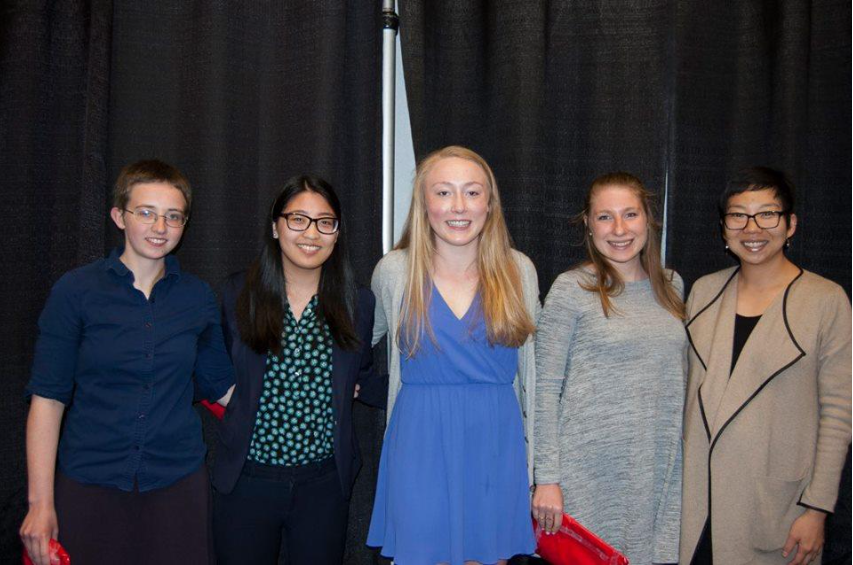By Sage Wesenberg, Biochemistry and Journalism 2019
This spring, at the annual Department of Physics awards dinner, four students were the first to receive the Undergraduate Research Award for Women in Physics. Thanks to Jonathan and Nicole Marom, Northeastern parents who funded these awards, students Tyra Christopherson, Jennifer Garland, Lauren Herschelman, and Abigail Timmel will be given the opportunity to conduct research projects with Northeastern physics faculty members in the upcoming 2017-2018 academic year.
Parent Jon Marom spoke on behalf of his inspiration behind this award.
“Our inspiration came from our daughter, as she faced some initial “male-bias” and started questioning the field that she was initially so excited about. She was strong enough to look past it, and we wanted to make sure that other women had a support structure to do the same,” he said. “If this program can allow women to see success on campus, nationally, and in themselves, we hope they will be encouraged to continue in the sciences.”
Christopherson, S’21, an applied physics major, and Hershelman, E’21, a bioengineering major, will be working with Assistant Professor of Physics Bryan Spring on a biomedical physics project. They will be studying new photodynamic therapy techniques that can be used to treat cancer. By using specific wavelengths of light, molecules containing tumor-fighting drugs become activated in the body to either release the drugs on the damaged cancer cells for treatment, or act as fluorescence to give images of the cancerous tissues. A laser fiber will be the light source that prompts these drug-containing molecules into action.
Garland, S’21, also an applied physics major, will work with Professor of Physics Donald Heiman in his nanophysics laboratory, to study topological insulators. These are materials whose interior acts as an insulator, while the surface simultaneously acts as a conductor. With this structure, electrons can only move along the surface, creating an electron spin that has the potential to be used as an alternative to electrical charges in electronic devices. Their work could lead to a way to produce energy in a more cost-efficient way.
Finally, Timmel, S’21, a physics major, will be working with Assistant Professor of Physics Adrian Feiguin studying theoretical condensed matter physics. Their research will consist of subjecting various materials to extreme environmental conditions. These may include very strong magnetic fields or ultra-low temperatures. They will observe the exotic behaviors that the materials display, which are dominated by quantum effects. With these observations and understanding of these behaviors, research could lead to the ability to use quantum materials as a replacement for silicon-based electronic technology.
“The beauty of this program is that it can change, and we can continue to play an active role in ensuring its success. In the end, this targeted giving is what prompted us to work with great facilitators in both the Parent Engagement office and the faculty in the College of Science,” Marom said.

(Left to right) Abigail Timmell, S’21, Jennifer Garland, S’21, Tyra Christopherson, S’21, Lauren Herschelman, E’21, and Toyoko Orimoto, assistant professor of physics. Courtesy photo.

